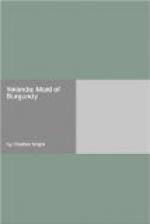CHAPTER XIII
A BATTLE IN MID AIR
A day or two after the supper of the wren pie, Max bought from a pedler a gray falcon most beautifully marked, with a scarlet head and neck, and we sent our squires to Hymbercourt, asking him to solicit from the duke’s seneschal, my Lord de Vergy, permission to strike a heron on the marshes. The favor was easily obtained, and we went forth that afternoon to try the new hawk.
The hours passed quickly. The hawk was perfectly trained, and as fierce as a mountain wildcat. Its combats in mid air were most exciting. It would attack its prey and drive it back to a point nearly over our heads. There it waged the battle of death. It had killed three herons, all of which had fallen at our feet, and we were returning home when a fourth rose from the marsh. We were on a side road or path, perhaps five hundred yards from the main highway.
At the moment Max gave wing to his bird, two ladies and three gentlemen came up the road, returning to Peronne, and halted to witness the aerial combat. That they were of the court, I could easily see by their habits, though the distance was so great that I could not distinguish their faces.
Never did hawk acquit itself more nobly. It seemed to realize that it had a distinguished audience. The heron opened the battle desperately, and persisted in keeping its course to the south. The hawk, not ready for battle till the prey should be over our heads, circled round and round the heron, constantly striking, but carefully avoiding the coup de grace. After the birds had flown several hundred yards away from us, and were growing small in the distance, the heron, less hardy than its knightly foe, showed signs of weariness and confusion. It changed its course, still flying away from us. This did not suit the hawk, and it continued circling about its faltering prey with a vicious swiftness well calculated to inspire terror. Its movements became so rapid that it appeared to describe a gray circle about the heron. These circles, with the heron as the centre, constantly grew smaller, and after a time we could see that the birds were slowly but surely approaching us.
When they were almost over our heads, the hawk rose with incredible swiftness above its prey, and dropped like a bolt of gray lightning upon the heron. Then followed a struggle that lasted while the birds fell three hundred feet. When within fifty feet of the ground the hawk suddenly spread its wings and stood motionless in mid air, watching its vanquished foe as it fell to a spot within ten yards of where we stood. The movement of the falcon in descending to us can only be described as a settling or gradual sinking, with outstretched, motionless wings. When Max piped, the bird flew to its master’s wrist and held down its beak for the hood.
At the close of the battle, the gentlemen of our little audience clapped their hands, and the ladies waved their kerchiefs. Max and I raised our caps and reined our horses toward the main road. As we approached, the ladies and one of the gentlemen resumed their journey toward Cambrai Gate, but the others awaited us. When we reached them we found, to our surprise, Duke Charles and my Lord d’Hymbercourt.




